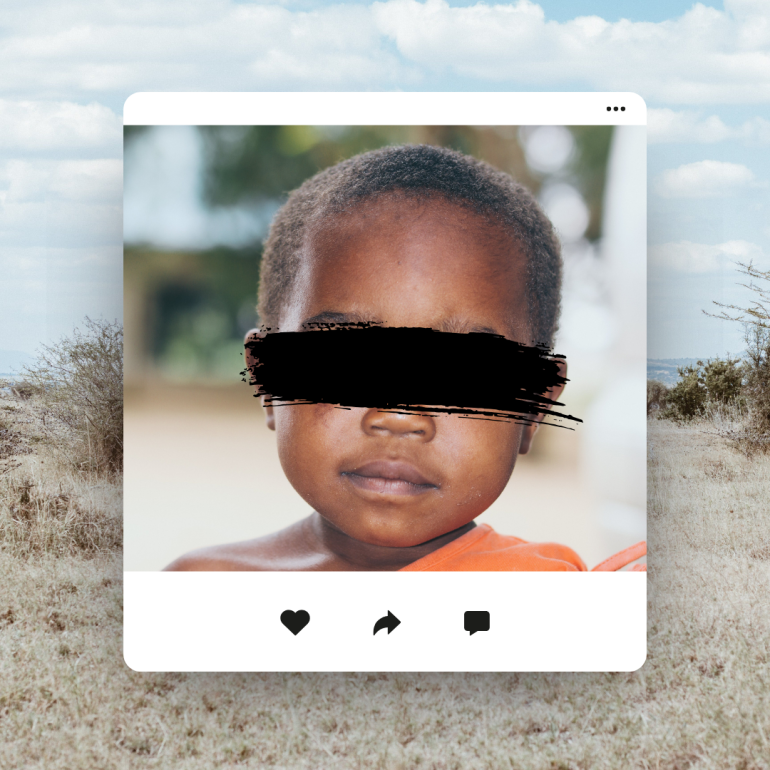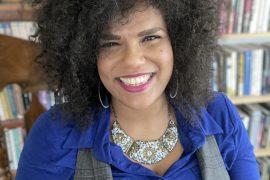This essay is a work of satire, in the style of the late Binyavanga Wainaina’s “How to Write About Africa” and Bright Alozie’s “How to Write About Nigeria” and “How to Write About African Women.” In this satirical homage, we explore the pesky stereotypes that often accompany Western perceptions and writings about African children. We hope that stereotypes satirically highlighted in this piece shed light on the dangers of a single story while advocating for the recognition of the humanity, agency, voices, and dignity of African children.
Step 1: The Stereotypical ‘Exotic’ Setting
First create an exotic setting showcasing an African child, be it a remote village covered in dust and poverty, a vibrant and untamed jungle, or desolate and barren lands devoid of life. Incorporate phrases such as ‘starving African children,’ ‘no peace and joy this Christmas in West Africa,’ ‘desperate and abandoned,’ ‘uneducated and hopeless,’ ‘widespread suffering and malnourishment,’ and ‘depressing,’ in the title of your work. Include words in your subtitle that highlight the challenges and hardships faced by African children, without acknowledging their strengths, voices, and achievements. On the book cover, feature an image depicting African children who are starving, naked, plagued by flies, and living in clay huts. Alternatively, showcase a malnourished child with a beggarly appearance, eating from an old plastic container or their bare hands. The most impactful photos of African children should capture them standing in line, eagerly awaiting food from a White voluntourist. Reinforce the notion of African children as victims and state in your preface that your story serves as a guidebook for rescuing them. Remember, narratives that portray African children as suffering from hunger, malnutrition, illness, and violence attract significant attention, compassion, assistance, and increased involvement from visitors from wealthier Western nations. Avoid using positive language to describe African children, as it may lead your Western audience to believe their work is complete. Keep in mind that your mission is to present Africa and African children as desperately reliant on Western support. To achieve this, your story should have a classic “us” (Westerners) vs. “them” (African children) feel to it.
Step 2: The Photo-Op, Poverty Porn, and White Saviorism
Start your narrative by informing your audience that with just €5, they can provide winter clothing for two destitute African children. No story about African children is complete without a healthy dose of the dangerous poverty porn littered with degrading imagery of African children. This type of portrayal only perpetuates the white savior complex which you must elevate. Every African child narrative requires a Western white savior who travels to impoverished African nations to help, without fully understanding the historical context and causes of poverty. The white savior aims to bring enlightenment, happiness, and salvation to African children, often as a volunteer, journalist, doctor, or tourist. The white savior’s journey must include a photo op. They diligently document their mission, snapping pictures of the wide-eyed, destitute African children who, by some miracle, have never seen a camera before. Each photo, usually in black and white, tells a story—and by a story, we mean a carefully crafted image that makes the savior appear even more saintly. The African child either stares blankly into the camera waiting for a viewer to help or looks up gratefully with smiles at receiving help. Whatever the case, the world should witness a moment of pure, unadulterated heroism displayed by the white savior.
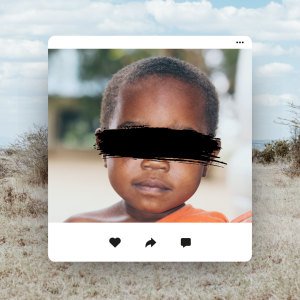
Use pictures of African children with distended bellies as a mere prop for charitable purposes. Do not seek their consent because they love being taken advantage of. Your portrayal of African children’s living conditions should be completely detached from reality. It is only through the mercy of international non-governmental organizations (INGOs) that the African child can be saved. Highlight the bazillion advertisements from various charities depicting starving African children, along with issues of Ebola, HIV/AIDS, wars, and extreme brutality, which have rendered all African children destitute and in desperate need of assistance. Commend the actions of Stacey Dooley, a prominent British media personality, for sharing a photograph of herself holding a young Ugandan boy named Mwesigwa Waiswa while filming for Comic Relief in 2019. That is classic poverty porn. However, refrain from mentioning the controversial story of Renée Bach, an American evangelical Christian without medical training, who faced accusations of practicing medicine on children at a Ugandan center where at least one hundred children lost their lives. Acknowledge the efforts of Christian missions aimed at saving African children for the sake of Christ and the Western world, but avoid discussing the case of Bernhard ‘Bery’ Glaser, a German individual accused of causing harm and sexually abusing underage Ugandan girls who were under his care.
Highlight the poverty in Africa, even though poverty, famine, child hunger, and food insecurity are global issues affecting all nations, including affluent ones. Remember to portray the entire continent as impoverished, with no Africans living modestly or in affluence. Emphasize the hunger and severe malnutrition experienced by African children, and how they go to bed hungry. Avoid mentioning that one in five American children also face daily hunger, or that a significant percentage of households in the U.S. experience food insecurity. Focus solely on African children being affected by poverty, without mentioning that “24.2% of children . . . in the EU [are] at risk of poverty or social exclusion” or that “19.6 million children in the EU live in poverty, and over two million of them live in Germany.” Always highlight water poverty in Africa and showcase images of African children consuming contaminated water. For $100 only, your esteemed readers can give a village in Africa clean water, but their donations are not needed in Jackson, Mississippi or Flint, Michigan where thousands of American children are also in dire need of clean and safe drinking water. Emphasize that African children are one drought or disease away from mass deaths but refrain from discussing the devastating consequences of America’s escalating water crisis and deteriorating drinking water infrastructure on children or the estimated 2.2 million Americans who live in homes without running water or basic plumbing.
Exaggerate the living conditions of African children to tug at the heartstrings of your readers. Focus solely on Africa’s poverty without acknowledging the role of the West or the devastating effects of colonialism and neocolonialism, which continue to hinder Africa’s progress. It is crucial to depict African children in extremely dire circumstances, dressed in tattered rags and surviving on meager portions of unappetizing gruel. To captivate your Western audience, go even further and portray them eating only insects or tadpoles. Describe their mothers as naked and flat-breasted, unable to provide proper nutrition for their children Even though forty-one percent of Africans live in urban areas and African cuisine is usually fresh, nutritious, flavorful, and diverse, make it seem impossible for an African child to experience city life, eat healthful and enough food, or live in decent housing. Your book can also serve as a parenting guide, teaching picky eaters a lesson about wasting food. Take inspiration from Kinderen voor Kinderen (‘Children for Children’), the Dutch children’s choir, which aimed to help African children by singing that “a child below the equator will likely grow up as a beggar.” Highlight to privileged white children who refuse to eat steamed broccoli how fortunate they are, as “all African children would undoubtedly kill for that plate of broccoli” they are rejecting.
Always portray African children as victims of poor health conditions, never as contributors to health solutions. Avoid mentioning their engagement in community health education and their role in spreading knowledge about hygiene, nutrition, and disease prevention. Instead, focus on their dependence on Western medical aid and expertise. Even though all countries face problems related to their health and care workforce, only emphasize Africa’s inadequacy. Be sure to mention that every child in Africa suffers from all kinds of debilitating diseases because African children are never healthy. However, do not mention the ongoing health disparities and challenges faced by Western countries, nor the prevalence of chronic childhood obesity in America. Similarly, disregard threats to healthcare in Europe and the poor health outcomes in the U.S., including low life expectancy and high suicide rates. Instead, focus on the opportunity for your Western audience to make a difference by contributing a mere €10, which can help vaccinate sixty children in Africa. Avoid discussing the historical exploitation of African and indigenous bodies by the West for medical purposes or the misuse of colonized bodies to establish white dominance in medicine. Drawing inspiration from Band Aid 30’s Ebola-themed lyrics, mention that there is “no peace and joy this Christmas in West Africa” and that African children do not know it’s Christmas because pandemics have wiped out their whole continent. However, do not mention that the Ebola crisis was limited to three African countries, nor the successful management of the crisis by African doctors and scientists. Talk about the impact of Covid-19 on African children, without acknowledging that Africa had comparatively lower mortality rates than other continents. Of course, Africa’s various successes in the field of public health, political stability, and economic growth are inconsequential in your story. The narrative should always be that without Western intervention, African children are doomed to suffer from a myriad of health issues.
Step 3: The Noble Savage and Voiceless African Child
Condemn African children to a perpetual cycle of cynical ideas and standards as they deserve no voice, agency, or dignity in your narrative. African children, like all Africans, are naturally noble savages whose lives should be devoid of happiness and complex emotions. Highlight their uncanny ability to communicate with animals, climb trees from infancy, and inability to think for themselves. Portray them as perpetually innocent and when speaking about them, never mention their parents or families. Instead, refer to them as AIDS orphans forced to live with surviving relatives or on the streets. Ignore the fact that African children have voices, and their history is filled with instances of activism. Ignore the historic 1976 Soweto Uprising that involved thousands of children, young Senegalese children advocating for good governance, and several teenage environmental and climate change activists. In your ideal Western paternalistic narrative, you are taking up the White Man’s Burden of leading noble savages and their children to civilization and light. If you should speak about child rights in Africa, always portray African children as passive recipients of Western advocacy efforts. Ignore their active role in advocating for their own rights and the impactful work they are doing to change policies and perspectives. Do not note their participation in international fora or their contributions to discussions on children’s rights. Instead, focus on how they are waiting to be saved by INGOs and activists. This will ensure the narrative remains that African children are without agency or voice in matters affecting their lives.
Refrain from depicting and writing about joyful, healthy, educated, and/or well-traveled African children. Instead, focus solely on their homelessness, disregarding the fact that children in your own country also suffer from the same problem. Avoid discussing the complex cultural rites of adulthood in many African communities that guide African children into adulthood, including societal rules, moral teachings, social responsibilities, and finding their life’s purpose. Disregard African children’s respect for family and cultural values. While African children may exhibit the spirit of ‘ubuntu’, by supporting each other and their communities, it is not necessary to mention this as it does not align with Western individualism and capitalism. Instead, highlight their questionable upbringing and laziness, in contrast to the ‘hardworking’ trust fund children of the West. Emphasize the importance of teaching them Western ways to make them responsible global citizens.
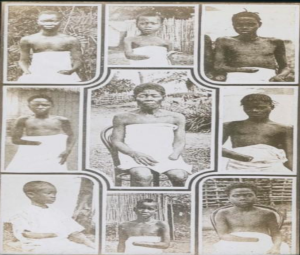
When discussing peacebuilding in Africa, depict African children as perpetual victims of conflict, never as agents of change. Ignore initiatives like the Rwanda Peace Education Programme, where children are actively involved in promoting social cohesion and peace, and the valuable contributions these children make to healing and reconciliation in their communities after conflicts. Instead, focus on their supposed need for Western intervention in peacebuilding. The narrative should always be that without Western guidance, African children are incapable of overcoming their violent histories. In your efforts to depict African children only as child soldiers in Africa, teenage wives, or scammers, do not acknowledge the atrocious child rape and sexual abuses by French soldiers and peacekeepers in the Central African Republic or the gross failure of the United Nations to bring the perpetrators to book. Disregard the youngest casualties of Belgium’s cruelest colonial regime in the Congo, where several of them endured brutality, mutilation, and abduction from their mothers, being branded as “children of shame.” Take good care to mention the manual labor that African children partake in but erase the histories of how Western governments and multinationals constantly plunder Africa’s resources to support their consumerism lifestyles and fund their governments and development schemes. Mention how American and European kids are more technologically advanced than their African counterparts and not how mica mined day and night by kids in Madagascar are used in various products consumed by millions of Americans including electronics, appliances, even trains and airplanes. Although smartphones, computers, and electric vehicles may be emblems of the modern world, do not mention that their rechargeable batteries are frequently powered by cobalt mined by workers, including at least 25,000 children, laboring in slave-like conditions in the Democratic Republic of Congo.
Avoid discussing the potential involvement of multinational chocolate and cocoa industries in exploiting children in Ghana or Côte d’Ivoire, or the complicity of Western companies like Cadbury, Nestlé USA and Cargill in child slavery and forced labor on West African farms where cocoa beans are harvested. Similarly, do not mention multinational tech firms like Apple, Dell, Microsoft, Google, and Tesla being implicated in cases involving child labor in the Democratic Republic of Congo (DRC). Instead, place the blame solely on Africans and their children. Do not draw attention to the contrast between glamorous technology displays and the harsh reality faced by African children working in dangerous conditions in the mining industry. Erase the fact that these children risk permanent lung damage and death while working in narrow tunnels. Focus on the satisfaction of owning the latest gadget and technology without considering the well-being of African children. To appease readers, mention that these children are often paid less than $1 per day, as this demonstrates your concern for their income and welfare. Avoid mentioning that due to the unresolved legacies of colonialism, racial discrimination, racial stereotypes, systemic racial discrimination and xenophobia, children of African descent are not even considered as children at all. Above all, completely disregard the inconvenient truth in Nick Dearden’s statement that “Africa is not poor, we [the West] are stealing its wealth.”
Step 4: The Uneducated and Passive African Child
Create an alternate reality the ignorance and illiteracy of African children prevail even though many African families are obsessed with education. Depict scenes of children laboriously trying to learn under trees, but never show them thriving in the well-equipped and accessible classrooms. Acknowledge that Westerners have taken on the burden of bringing Western education to Africa—after all, it is the ultimate measure of success and progress—but ignore precolonial and contemporary indigenous education and community-based knowledge systems in Africa which encompassed various aspects of physical, cultural, spiritual, religious, vocational, and intellectual development for African children. Never mind that some of the oldest schools in the world were established in Africa. Ensure that any mention of their traditional learning methods is framed as outdated and inadequate, underscoring the need for Western educational systems. You may mention Bridge International Academies to demonstrate that educated Westerners are trying to help African children, but it would be incredibly taboo to mention the sexual violence perpetrated by some of its teachers against numerous African students or that the World Bank helped cover these sex abuses. Indeed, it would be equally taboo to mention the Day of the African Child on June 16, which commemorates the activism of African children in defending their rights and serves as a reminder to reflect on and address the challenges that African children face daily. Above all, omit any reference to Tanzania’s successful abolition of primary school fees in 2015, as this might suggest self-sufficiency and progress without Western intervention.
Disregard the incredible achievements of many well-educated African children who excel[ed] in their schools and colleges at home and in diaspora. Do not mention that Nigerians, for instance, are the most highly educated immigrant population in the U.S. Also disregard the numerous African children who are fluent in indigenous, Western, and Asiatic languages, and have earned multiple certificates and degrees, breaking records along the way. Ignore several child prodigies, young climate change activists, teen literary stars, and genius kids from Africa. Ignore the vibrant child author scene in South Africa, where young writers are creating stories rich in their cultural heritage. Make sure to omit any reference to their creative expressions and the ways they are reshaping African narratives on their own terms. Avoid mentioning young activists like Uganda’s Leah Namugerwa, who are leading tree planting campaigns and making significant environmental impacts. Instead, depict them as helpless and waiting for Western environmentalists to rescue them. Never acknowledge their knowledge of local ecosystems or their innovative solutions to environmental challenges. The narrative should always emphasize their dependency on Western technology and aid to combat climate issues. Even though African children from different parts of the continent have etched their names into the annals of inventors and innovations, do not say their names. Always paint a picture of African children as mere consumers of Western technology, rather than as creators and innovators in their own right. This will ensure the narrative remains that Africa is always a step behind in technological advancements.
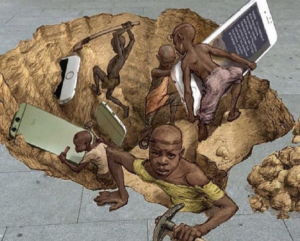
Even though the internet, social media, technology, and mobile devices intertwine with the lives of African children, avoid mentioning the young tech geniuses across Africa who are developing local solutions to global problems. Instead, emphasize their lack of innovation and picture the African kid marveling at even the slightest showing of modern technology, like a phone or camera. Their reactions should be akin to watching magic for the first time. This is Africa—nothing less would not do justice to the stereotype. Disregard the achievements of Promise Nnalue, Jessica Osita, Nwabuaku Ossai, Adaeze Onuigbo, and Vivian Okoye, a group of five girls aged between 13 and 15 from Regina Pacis Secondary School Onitsha, Anambra state, Nigeria. These girls represented Nigeria and Africa at the 2018 World Technovation Challenge in Silicon Valley, San Francisco, U.S. They emerged victorious by defeating teams from one hundred and fifteen countries in the qualifiers and twelve teams from around the world in the finals. Do not mention William Kamkwamba who at the age of 14 built a wind turbine to generate electricity for his family home in Wimbe, Malawi. Similarly, the names of Duro-Aina Adebola, Akindele Abiola, Faleke Oluwatoyin, and Bello Eniola, four teenage female inventors from Nigeria, who developed a urine-powered generator capable of providing six hours of uninterrupted electricity, can be omitted. Forget Kelvin Doe (AKA “DJ Focus”), a Sierra Leonean self-taught engineer who built his own generator and radio transmitter at the age of 13. Do not mention that in 2012, Kevin became the youngest person in history to participate in the Visiting Practitioner’s Program at MIT, nor his global recognition for his visionary ideas. Furthermore, the accomplishments of David Gathu and Moses Kinyua, two young engineers who invented the world’s first bio-robotic arm controlled by brain signals, should not be acknowledged for their engineering brilliance. The fact that Betelhem Dessie, an Ethiopian web and mobile technologies developer, founder, and CEO of iCog—Anyone Can Code (ACC), already holds four individual patented projects and three collaborative ones, and began her tech career at the age of 9, should not be mentioned. It is also unnecessary to mention that CNN recognized her as “the youngest pioneer in Ethiopia’s fast emerging tech scene.”
Disregard the international achievements of young African athletes in competitions like the Olympics and Commonwealth Games. Do not mention the records set by athletes from Kenya, Ethiopia, or Nigeria. Instead, focus on how they need Western coaching and sports infrastructure to truly succeed. The narrative should always be that their talent is raw and unrefined, requiring Western refinement to reach its full potential. In discussions about culture and art, always depict African children as devoid of any real cultural depth or artistic talent. Avoid acknowledging their contributions to preserving and promoting their rich cultural heritage through music, dance, and art. Instead, focus on how they need Western artistic influences to truly develop their talents. Do not mention the young artists in Mali, Ethiopia, and Egypt who are proudly showcasing their cultural identities. This narrative will reinforce the idea that African culture is primitive and in need of Western enhancement.
If you wish to identify exceptional individuals, focus solely on the intelligent African children who hold citizenship in European and North American countries. For instance, consider Esther Okade, a Nigerian British math prodigy who began her math degree at a British university in 2015 at the age of 10. Another example is Zuriel Elise Oduwole, a Nigerian American education advocate and filmmaker renowned for her efforts in promoting girls’ education in Africa. However, when discussing their accomplishments and talents, attribute them to their American or British backgrounds, disregarding their African heritage. It is important to limit your praise and recognition, avoiding any mention of Esther’s outstanding performance as a top freshman in her college class or her authorship of math workbooks for children titled “Yummy Yummy Algebra.” Similarly, ignore the fact that Zuriel’s advocacy led her to being the youngest person ever profiled in Forbes Magazine in 2013, and being recognized in 2014 as the most powerful 11-year-old in the world by Business Insider. Disregard the fact that, at the age of 12, she became the world’s youngest filmmaker to produce and edit her own work, which was showcased in multiple movie chains and screened in various countries. Let the sad pages of history guide you. Look to the experience of Thomas Fuller, a real-life “human calculator” and African child prodigy, who was stolen from Africa and enslaved in America. Before arriving on American soil, young Thomas, at the tender age of 14, had already mastered complex mathematical operations through rigorous training. Astonishingly, he effortlessly solved intricate math puzzles with his sharp intellect alone, without the aid of any mathematical tools. Despite his extraordinary mathematical abilities, the predominantly White-owned American press deliberately chose to overlook his accomplishments, instead focusing on his inability to read or write. Lastly, as much as possible, emphasize the difficulty in pronouncing indigenous African names. It is essential to choose names that sound unpronounceable to the Western tongue, such as Ọbianujuakụ, Echezonachukwu, Ọmọ́táyọ̀, N’gumbele, Kwakuwambe, or Akhuxolo to evoke a sense of being on an African safari.
Step 5: Dedication
Finally, dedicate your book to African children who are all suffering from starvation and facing death unless the kind West intervenes. Praise the white savior again for crassly barging in with generous offers of help when African people are entirely capable, and willing, to help themselves. Remember, white saviorism is the latest wave of [neo]colonialism but do not mention it. Instead, demonstrate your empathy by including a toll-free number (-800) that can be dialed to donate to a starving child in Africa today because your $1 donation can save the life of that kid. It is only through your €50 that forty children in Africa can have education and for just $2 a day, you can liberate many starving and illiterate African children. These final actions are crucial because you have nothing to gain—you only truly wish to Save the Children.

